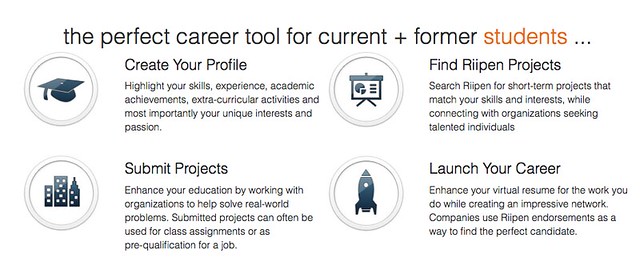Victoria’s Riipen Aims to Reconcile Academic and Real-world Experience
 Riipen is a newly launched startup born in Victoria, BC.
Riipen is a newly launched startup born in Victoria, BC.
Its official launch took place at the Discover Tectoria 2013 event where it was one of 19 companies in Startup Alley.
Riipen was created by three UVic students who were all studying Commerce at the Peter B. Gustavson School of Business. After experiencing the disconnect between what they were learning during their education and what the real world demanded of them in terms of experience, Dave Savory, Dana Stephenson, and Dylan Chernick came up with an idea that could reconcile the two realities.
Their idea won the Distinguished Entrepreneur of the Year Fellowship Award in September of 2012, which gave the founders a $10,000 grant from UVic’s Gustavson School of Business, to launch the company. Adding UVic Vanier Scholar, Richard Tuck, and two talented developers from the UVic Computer Science program, Braden Simpson and Jordan Ell, to the mix, the team of six recently graduated from VIATeC’s accelerator program.
The initial aim was to create a platform for students that would help them do school projects that could have a real impact in the business world. Companies were asked to participate by submitting real projects for students to work on. The “winning” idea or solution had the opportunity to turn into class credits, a paycheque, or even an internship or potential job offer.
Following this train of thought, Riipen evolved into a different kind of platform, one that offers the possibility for students to connect with potential future employers while completing their education so that they can gain real world experience and graduate ready to enter the job market. Companies also benefit by taking advantage of the creativity and innovation that bright young minds can offer. By using Riipen, they are able to tap into a pool of potential employees without having to go through a traditional hiring process to weed out lackluster candidates. The platform is a useful learning tool for educational institutions as well, becoming a contemporary and ever-changing resource of new business projects and problems.
The Riipen platform allows students to create a profile that highlights their skills, interests, and academic achievements. They can then browse through the projects available based on industry, specific skills, due dates, and whether the project has the opportunity to turn into a paid position. The projects are generally short-term and can be completed within a semester, or other specified time-frame, and offer students the flexibility to work on them around other obligations such as classes or part-time jobs. Projects are also often relevant to what students are learning and can further contribute to their academic development while helping them gain valuable work experience.
Companies are also able to create their own profiles to showcase their brand, work culture, and products or services. They pay a small fee to post projects on Riipen and can directly connect with students that apply for their projects in a variety of ways (email, phone, video conference, in-person meeting). Projects are open to all students, meaning that multiple students can work on the same project, which helps companies take advantage of different talents.
Riipen also offers an option to create incentives in order to gain more exposure for projects and increase the quality of applicants and submissions. Incentives are flexible in nature, but require the company to submit feedback to all students who complete the project in order to help them build their virtual resumes.
Currently, there are around 60 projects available, with an average of 15 to 20 being added each month. More than 250 students have already created a Riipen profile to engage with companies and around 20 to 30 new students sign up each week. The company has plans to move the headquarters to Vancouver in the near future where it will focus on expanding to all major cities in North America.




